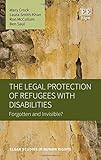The legal protection of refugees with disabilities : Forgotten and invisible? / Mary Crock, Laura Smith-Khan, Ron McCallum, Ben Saul, Sydney Law School, The University of Sydney, Australia.
Series: Elgar studies in human rightsPublisher: Cheltenham, UK : Edward Elgar Publishing, [2017]Description: xviii, 314 pages : illustrations ; 24 cmContent type:- text
- unmediated
- volume
- 9781786435439 (hbk)
- 1786435438 (hbk)
- 341.486 CRO 23
- K3230.R45 C76 2017
| Item type | Current library | Collection | Call number | Status | Date due | Barcode |
|---|---|---|---|---|---|---|
 BOOKs
BOOKs
|
National Law School | Reference | 341.486 CRO (Browse shelf(Opens below)) | Available | 36358 |
Browsing National Law School shelves, Collection: Reference Close shelf browser (Hides shelf browser)

|

|

|

|

|

|

|
||
| 341.481 MCD Human rights and world public order : | 341.481 WHE The idea of international human rights law / | 341.48572 STA Human rights and children / | 341.486 CRO The legal protection of refugees with disabilities : | 341.486 CRO Protecting migrant children : | 341.486 HAT-I Human rights and refugee law Vol. I | 341.486 HAT-II Human rights and refugee law Vol. II |
Includes bibliographical references (pages 279-303) and index.
Disability in refugee populations;
Paradigm shift : the CRPD, international law and disability in displacement;
Responding to disability in displacement : country reports;
Identifying disability;
Lived experience of disability in displacement;
Disability, intersectionality and context;
Access to protection : refugee rights and status determination processed;
Disability rights, maritime interdiction and immigration detention;
The right to survive : disability and access to basic humanitarian assistance;
Beyond mere survival : rights to education, employment and community participation;
The other 'durable solutions' for refugees with disabilities : resettlement and repatriation;
Strategies for realizing rights for refugees with disabilities.
Refugees living with disabilities are often forgotten or invisible during acute crises of human displacement. This groundbreaking work examines the experiences of persons with disabilities who have crossed borders in search of protection from disasters or conflict, and analyses the existing legal frameworks for their protection. The authors deftly explore the intersection between one of the oldest international human rights treaties, the 1951 Refugee Convention, with one of the newest, the Convention on the Rights of Persons with Disabilities (CRPD). Drawing on pioneering fieldwork in six countries - Malaysia, Indonesia, Pakistan, Uganda, Jordan and Turkey - this book examines how the CRPD is, or should be, changing the way that governments and aid agencies engage with and accommodate refugees with disabilities. Its timeliness is underscored by the adoption in 2016 of the UN Charter on Inclusion of Persons with Disabilities in Humanitarian Action at the World Humanitarian Summit. Engaging and thought-provoking, this book will captivate any scholar studying international law, development, disability rights and refugee and forced migration studies. It is also an imperative resource for practitioners and policymakers in the humanitarian and development sector, as well as international human rights organisations-- Back cover.

There are no comments on this title.